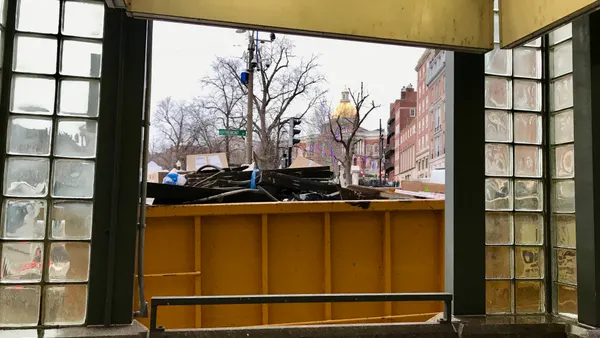Dive Brief:
- Ann Arbor, MI City Council has approved a $295,690 emergency purchase order for Waste Management (WM) to operate and evaluate the city's recycling for at least six weeks, according to MLive.
- Local environmentalists argue that Waste Management's views on recycling — and dependency on landfill profits — aren't in-line with the city's recycling goals.
- City officials have said they are requesting proposals (RFPs) for long-term contracts. Any interested companies, including Waste Management, will be able to compete for the contract after WM's six-week term is complete.
Dive Insight:
This decision to bring on Waste Management as the operator of the Ann Arbor recycling plant is in response to a recent fiasco involving ReCommunity, the city's prior recycling plant operator, which was abruptly dropped by the city earlier this summer due to safety violations. While the company filed a complaint in federal court claiming that Ann Arbor "breached its contract" and "broke promises," recycling was piling up and the city had to take action to ensure the service continued.
While Ann Arbor could have put out immediate RFPs and waited in the hopes that a favorable recycling operator would come along, its decision to decisively choose Waste Management was driven by the knowledge that the company was qualified to do the task — however, not all parties.
"To my mind, employing Waste Management to run the city of Ann Arbor's recycling facility is something like hiring a former oil company executive to run the Department of Environmental Quality. It flies in the face of all the values we say we hold dear," said Mike Garfield, director of the Ecology Center, to MLive. However Garfield's concerns were shot down by Waste Management, which stated the company's intentions are to benefit Ann Arbor, not the company.
"Waste Management will carry out the stipulations in a contract the City Council passes as the Material Recovery Facility belongs to the city of Ann Arbor and not Waste Management," said company spokesman Tom Horton in a written statement. And, by stating these intentions in writing to the residents of Ann Arbor, Waste Management is holding itself to the expectation that it will seek the diversion rates that Ann Arbor strives for — whether that was its original intention or not.
Despite environmentalists' concerns regarding the temporary contract, Ann Arbor's decision to find a recycling plant operator was desperately needed if the city wanted to meet any goals. As the RFPs from other companies come in, it will be interesting to observe which ends up with the long-term contract — and if environmentalists are happy with the final decision.









